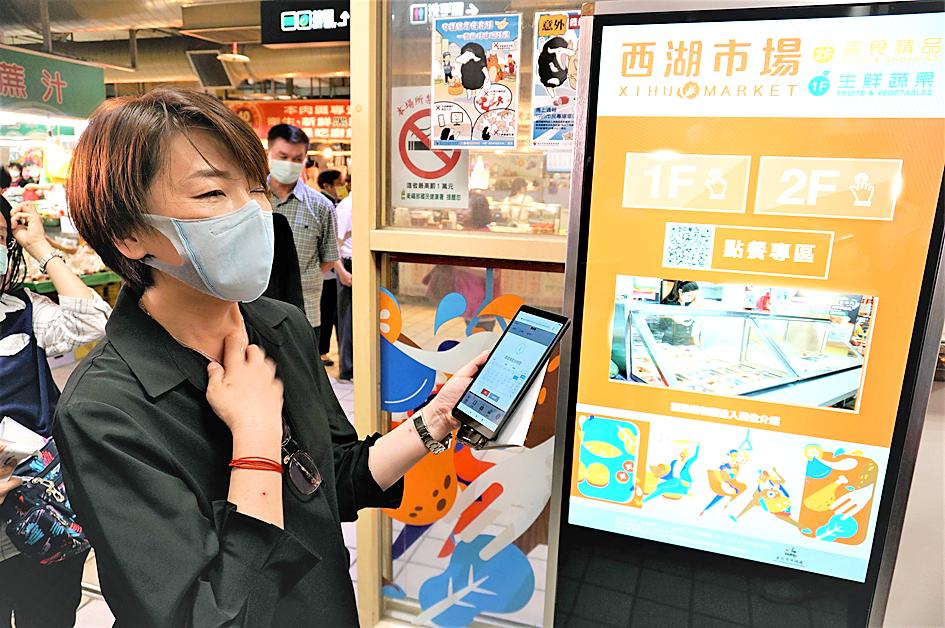The Taipei Market Administration Office yesterday introduced touchscreen kiosks at Xihu Market (西湖市場) that allow customers to order meals in the food court by using their smartphone to scan a quick response code.
The system was unveiled for the Taipei Traditional Market Festival, which opened at Xihu Market.
Taipei Deputy Mayor Vivian Huang (黃珊珊) said that as the market shares a building with MRT Xihu Station and receives ample foot traffic, the office last year budgeted funding to renovate the market in the hopes of attracting more visitors and making the market a tourist attraction in Neihu District (內湖).

Photo: CNA
The renovation included changing floor tiles, tables and chairs at the market’s second-floor food court; improving entry, exit and information signs and layout maps; and remodeling 15 stalls, the office said.
Five touchscreen kiosks, which were installed near entrances this week, display products sold at each food stall and provide codes that customers can scan to order meals, it said.
The market is near Neihu Technology Park (內湖科技園區) and many of the park’s workers frequent its food court, the office said, adding that it collaborated with two technology companies to introduce the point-of-sale kiosks in the hopes of making food orders more convenient and less time-consuming.
The office said that it plans to introduce the system at three other traditional markets in the second half of this year.
With the Central Epidemic Command Center easing disease prevention measures and the city’s public facilities beginning to gradually reopen to the public today, people can choose not to wear a mask if they can maintain social distancing on public transportation, Huang said.
However, vendors and visitors at the city’s public markets are still required to wear masks, she said.

Taiwan is stepping up plans to create self-sufficient supply chains for combat drones and increase foreign orders from the US to counter China’s numerical superiority, a defense official said on Saturday. Commenting on condition of anonymity, the official said the nation’s armed forces are in agreement with US Admiral Samuel Paparo’s assessment that Taiwan’s military must be prepared to turn the nation’s waters into a “hellscape” for the Chinese People’s Liberation Army (PLA). Paparo, the commander of the US Indo-Pacific Command, reiterated the concept during a Congressional hearing in Washington on Wednesday. He first coined the term in a security conference last

Prosecutors today declined to say who was questioned regarding alleged forgery on petitions to recall Democratic Progressive Party (DPP) legislators, after Chinese-language media earlier reported that members of the Chinese Nationalist Party (KMT) Youth League were brought in for questioning. The Ministry of Justice Investigation Bureau confirmed that two people had been questioned, but did not disclose any further information about the ongoing investigation. KMT Youth League members Lee Hsiao-liang (李孝亮) and Liu Szu-yin (劉思吟) — who are leading the effort to recall DPP caucus chief executive Rosalia Wu (吳思瑤) and Legislator Wu Pei-yi (吳沛憶) — both posted on Facebook saying: “I

The Ministry of Economic Affairs has fined Taobao NT$1.2 million (US$36,912) for advertisements that exceed its approved business scope, requiring the Chinese e-commerce platform to make corrections in the first half of this year or its license may be revoked. Lawmakers have called for stricter enforcement of Chinese e-commerce platforms and measures to prevent China from laundering its goods through Taiwan in response to US President Donald Trump’s heavy tariffs on China. The Legislative Yuan’s Finance Committee met today to discuss policies to prevent China from dumping goods in Taiwan, inviting government agencies to report. Democratic Progressive Party Legislator Kuo Kuo-wen (郭國文) said

Sung Chien-liang (宋建樑), who led efforts to recall Democratic Progressive Party (DPP) Legislator Lee Kun-cheng (李坤城), was released on bail of NT$80,000 today amid outcry over his decision to wear a Nazi armband to questioning the night before. Sung arrived at the New Taipei District Prosecutors’ Office for questioning in a recall petition forgery case last night wearing a red armband bearing a swastika, carrying a copy of Adolf Hitler’s Mein Kampf and giving a Nazi salute. Sung left the building at 1:15am without the armband and covering the book with his coat. Lee said today that this is a serious